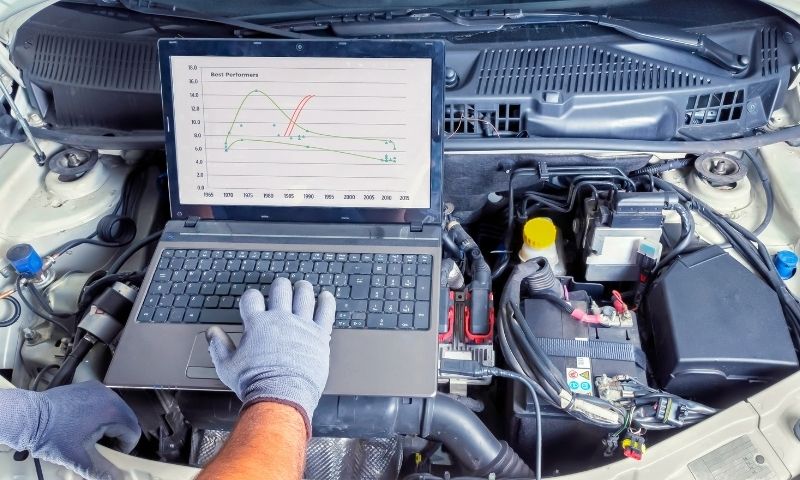A Leading Resource Built By Automotive Lovers, For Automotive Lovers.
We’ve helped consumers around the world make their purchasing decisions.
Latest Articles
A car lock does not usually drain the battery when the key is out of the ignition. However, if the doors are left unlocked with lights or alarms on, it… Car heaters can use a lot of battery power in electric vehicles. They often consume about 3-4 kW of energy. This can reduce the driving range by roughly five miles… Leaving car lights on can drain the battery quickly. To extend battery life, always turn off the lights when not in use. Also, avoid letting the vehicle sit idle for… To check your Prius battery life, observe the battery monitor while driving. A steady green arrow indicates a full charge. Use a voltmeter to check voltage at the terminals during… To check your MacBook’s battery life, click the Apple menu and select System Settings. Go to the Battery section in the sidebar. Here, you will find the Battery Health option…. To charge the battery on a Chrysler Sebring, connect a trickle charger to the positive (red) and negative (black) terminals at the jump start points in the engine bay. Make… A car does not have to be moving to charge the battery. The alternator produces usable energy when the engine is idling. Revving the engine increases its RPM, allowing the… A car charger draws electricity even when the battery is fully charged. The charger stays plugged in and uses a small amount of power. This happens even if the vehicle… A car battery warranty generally does not transfer to a new owner. It often applies only to the original owner. For instance, REDTOP and YELLOWTOP batteries usually have a three-year… Yes, a car battery voltage decreases over time because of its self-discharge rate. A fully charged 12-volt battery starts at around 12.6 volts. When the battery is not used, it… A car battery’s vent port safely releases flammable and toxic gases. Venting is necessary; blocking it can cause pressure build-up and rupture the battery. If the battery is inside the… To change a battery’s voltage, connect multiple batteries in a series connection. Connect the positive terminal of one battery to the negative terminal of the next. This battery configuration adds… Battery terminals are dirty when you see corrosion as a white, green, or blue substance. This happens due to battery acid reacting with hydrogen gas and air. Check your car… Car batteries supply DC (direct current) voltage. This voltage is stable and reliable. It is essential for starting the engine and powering electronic components in the vehicle. When the ignition… Automotive lithium-ion batteries need an enclosure for safety. The enclosure protects from external conditions like harsh weather and vibration. It also enables proper venting to manage temperature and pressure. Following… You can turn Wi-Fi signals into energy using a device called a “battery-free rectenna.” This technology captures Wi-Fi energy for charging. However, it is often insufficient for fully charging a… To reduce battery drain on Wahoo Fitness devices, adjust settings in the ELEMNT App. Turn off all-day heart rate monitoring and steps in My 24/7 Data. Disable notifications under Alerts…. To improve chemical battery design, optimize components like electrolytes, separators, and casings. Focus on weight reduction to enhance energy density. Use advanced materials and innovative designs that maintain strength while… The life of a lithium-ion battery is calculated using the formula: Life (in cycles) = (Capacity x 100) / (Discharge rate x Depth of discharge). Important factors include temperature, charge… A car battery usually lasts around four years. Its lifespan depends on mileage, driving habits, and temperature effects. Driving in cold climates or often taking short trips can reduce battery… A weak car battery affects pickup indirectly. While it doesn’t change acceleration directly, a low battery may make the engine work harder to crank, increasing fuel consumption. Additionally, the battery… Yes, car battery group size matters. Each group size has specific physical dimensions and amp-hour ratings. Using the correct size ensures your battery is compatible with your vehicle, leading to… Tesla advances battery technology by creating next-gen 4680 cells with silicon carbon anodes. This innovation boosts energy density, battery range, and charging speed. The new cells, NC05, NC20, NC30, and… Yes, during a long charge, the electrolyte in Flooded Lead Acid (FLA) batteries can become cloudy, leading to a light grey appearance. This cloudiness is normal. It indicates that sulfation,… To check the battery life of your Nintendo Switch controllers, open the HOME Menu. Select ‘Controllers’ to view the battery level for each paired controller. Make sure all controllers are… A weak car battery can negatively impact vehicle performance. You may notice dimming headlights or flickering lights. These signs reflect poor battery health and can reduce voltage supply to vital… To measure battery discharge, wait 8 to 12 hours for voltage stabilization. Then, assess its state of charge (SoC) using voltage levels. Perform a discharge test to evaluate capacity. Use… A car battery can drain when using a start-stop system. This system turns off the engine at stops to save gas. However, restarting the engine requires battery power. While it… Overcharging occurs in a vehicle’s battery due to issues in the charging system, especially a faulty alternator. A malfunctioning voltage regulator may create excessive voltage over 14.5 volts, which leads… To make a 6V, 5A battery charger, use a 6V transformer and two 1N5408 diodes for converting AC to DC. Include voltage detection to monitor the battery level. Ensure to…Does Car Lock Drain Battery? Impact on Battery Life and Performance Explained
Car Heater: Does It Use Lots of Battery Power in Electric Vehicles?
Do Car Lights Affect Battery Life? Explore Headlights, Battery Drain, and Common Mistakes
Check Prius Battery Life: Essential Tips to Diagnose Hybrid Battery Health
Determine Battery Life on MacBook: Tips to Check Battery Health and Cycle Count
Charging the Battery on a Chrysler Sebring: Methods, Tips, and Common Issues
Does Car Have to Be Moving to Charge Battery? Idling vs. Driving Explained
Does a Car Charger Draw Electricity When Battery is Fully Charged? Power Consumption Explained
Car Battery Warranty: Does It Transfer to the New Owner of a Used Vehicle?
Does Car Battery Voltage Decrease Over Time? Causes and Acceptable Voltage Loss Explained
Do You Need to Poke the Car Battery Vent Port for Safety and Maintenance?
Change the Voltage of a Battery: Tips to Vary, Increase, and Optimize Output
Signs Your Battery Terminals Are Dirty: How to Tell and Clean Corrosion Effectively
Car Battery: Does It Supply AC or DC Voltage? Understanding Its Basics and Benefits
Does Car Battery Need to Be in Enclosure? Importance of Safety and Design Best Practices
Wi-Fi Charging: How Can Wi-Fi Be Turned to Charge Your Battery Effectively?
Wahoo Fitness: Tips to Prevent Battery Drain and Optimize Device Performance
Improving the Design of Chemical Batteries for Better Performance and Future Innovations
Determining Battery Life: Tips for Measuring Health and Capacity
Car Battery Life: Does It Depend on Mileage for Optimal Performance?
Car Battery Level: How It Impacts Pickup and Acceleration Performance
Does Car Battery Group Size Matter? Understanding Its Impact on Performance and Compatibility
How Tesla Advances Battery Technology for Next-Gen EV Innovation and Production
Does Car Battery Electrolyte Become Cloudy During Long Charge? Causes & Contaminants
Check Your Switch Controllers’ Battery Level: How to Tell Remaining Charge Easily
Does Car Battery Affect Performance? Discover Its Impact on Fuel Efficiency!
Measure Battery Discharge: A Comprehensive Guide to Calculating Remaining Capacity
Does Car Battery Drain When Stop-Start Feature Is Used? Causes and Solutions Explained
How My Vehicle Can Overcharge the Battery: Signs, Causes, and Fixes
DIY Guide: How to Make an Automatic Charger for a 6V, 5A Battery at Home



